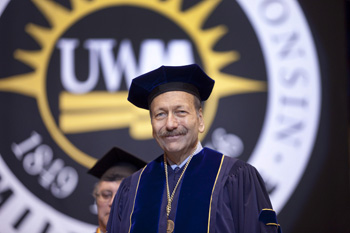Campus News
Chancellor receives honorary degree from alma mater
Chancellor Blumenthal was awarded an honorary doctoral degree from his alma mater, the University of Wisconsin-Milwaukee (UWM).

The spring morning, or Black Commencement, was held May 22 in the U.S. Cellular Arena. George Blumrnthal received the Honorary Degree, Honorary Doctor of Astrophysics and Leadership in Higher Education.
Chancellor Blumenthal was awarded an honorary doctoral degree in astrophysics and leadership in higher education from his alma mater, the University of Wisconsin-Milwaukee (UWM).
Blumenthal, who earned a B.S. in physics from UWM in 1966, was the keynote speaker during UWM’s morning commencement ceremony on Sunday, May 22, 2011.
Blumenthal thanked UWM Chancellor Michael Lovell and campus officials, saying he was “deeply honored” to receive the degree. Then, turning to thousands of graduates gathered from inside the 12,700-seat U.S. Cellular Arena, he quipped, “Even though I didn’t work nearly as hard for this degree as all of you did for the diplomas you’ll receive today!”
Due to the number of graduates, UWM hosted two commencement ceremonies. Blumenthal addressed bachelor’s, master’s, and Ph.D. candidates in the College of Letters and Science, the School of Architecture and Urban Planning, the School of Information Studies, and the Peck School of the Arts.
Blumenthal’s remarks focused on the value of a U.S.-style college education, which prepares “well-rounded” graduates, unlike many universities in Europe and Asia that focus on vocational preparation.
“Whatever your next step is… you have already taken the most important step toward a great future,” he told the crowd.
He urged graduates to be confident and to focus on what they’ve accomplished, rather than worry about the unknown as they begin this new chapter in their lives.
“The tricky thing about self-confidence is that it matters so much—but it’s not always there when you need it the most,” he said.
Blumenthal reassured those in the audience who might not know what their next step is, saying, “If someone had told me when I was sitting in your seat that I’d end up the chancellor of a university, I would’ve said they were nuts!”
He recounted his own post-college doubts as he headed to graduate school at UC San Diego.
“I didn’t come from a long line of academics,” he said, noting that he and his sister were the first in their family to earn college degrees. When he arrived at UCSD, he was “petrified.”
“I was surrounded by students from the top private universities in the country,” he recalled. “I wondered if I was as well-prepared as I needed to be to compete with them.”
He swiftly realized that the education he got at UWM was “every bit as good as what students got at Harvard, Princeton, and MIT.”
Blumenthal made a pitch for public research universities, urging graduates to lobby legislators on behalf of their alma mater and to “give back” to UWM by making a donation before they depart.
Then he offered three pieces of advice, each “somewhat paradoxical.”
First, he urged graduates to be confident and stay humble. “There’s a lot left to learn,” he reminded them.
Second, he encouraged graduates to be “focused and persistent about pursuing your goals, and yet remain open to unexpected opportunities.” The best careers, he said, are built with a combination of focus and serendipity.
And finally, he concluded with a reminder to “work hard on whatever lies ahead, but also take time out to think the big thoughts.” It is important to reflect on what you’re learning, what you’re seeing, and the impacts you’re having on the world, he said.